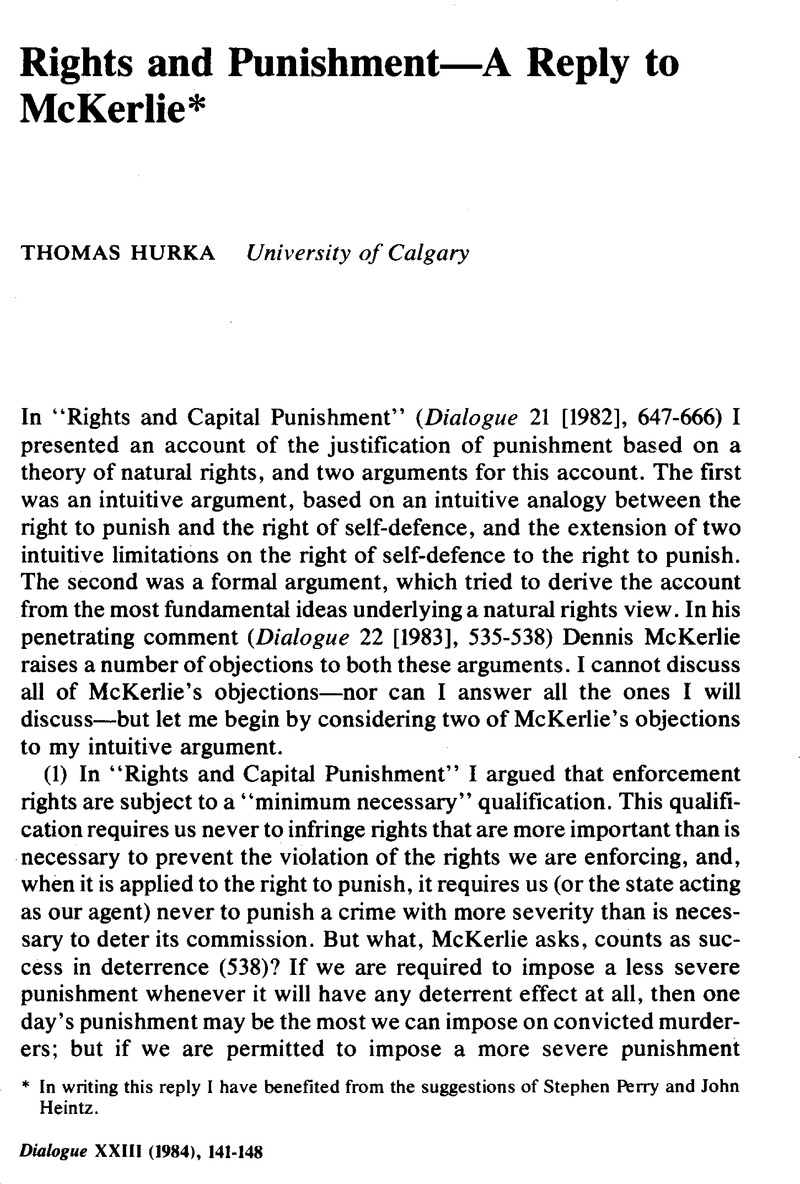Article contents
Rights and Punishment—A Reply to McKerlie*
Published online by Cambridge University Press: 05 May 2010
Abstract

- Type
- Interventions
- Information
- Dialogue: Canadian Philosophical Review / Revue canadienne de philosophie , Volume 23 , Issue 1 , March 1984 , pp. 141 - 148
- Copyright
- Copyright © Canadian Philosophical Association 1984
References
1 Nozick, Robert, Anarchy, State, and Utopia (New York: Basic Books, 1974), 61–62.Google Scholar
2 In the same way the rights view does not take account of degrees of risk. If a man points a fully loaded gun at my head and starts to pull the trigger I am permitted to kill him to prevent him from doing so. But if he puts one bullet in the gun, spins the barrel, and then starts to pull the trigger I am also permitted to kill him to prevent him from doing so (on this see Nozick, Anarchy, State, and Utopia, 126). That the rights view is insensitive to numbers and degrees of risk has one important technical implication. It means the view can operate its two qualifications with only an ordinal measure of the importance of a right. (Multiplying the importance of a right by either numbers or degrees of risk would require at least a cardinal measure.) Since I do not think anything stronger than an ordinal measure can be derived, I regard this technical implication as a welcome one.
3 Note that it is not a requirement of forward-lookingness in general. Even if every liberty is described in forward-looking terms it may be that who has the right to exercise certain liberties depends on facts about the past, e.g., facts about who has made what promises to whom.
4 For a discussion see Nozick, Anarchy, State, and Utopia, 126-129.
5 The idea of “tracks” is taken from Joel Feinberg, “The Interest in Liberty on the Scales”, in his Rights, Justice, and the Bounds of Liberty (Princeton, NJ: Princeton University Press, 1980), 30–44Google Scholar.
6 Note that this question about justification is independent of the technical questions discussed by Judith Jarvis Thomson in Self-Defense and Rights, The Lindley Lecture (Lawrence, KS: University of Kansas Press, 1977). Thomson asks whether a rights view will say that one person's right of self-defence entitles him to kill another because (i) the other has forfeited his right to life (“forfeit”); (ii) because the other's right to life is really only the right not to be killed when one is not trying to kill another (“factual specification”); or (iii) because the other's right to life is overridden by his victim's right of self-defence (“overriding"). It should be evident that selecting one of these accounts will not answer any questions about justification, for we will still want to know why persons should forfeit those rights, or have rights which are factually specified in those ways, or have rights which are overridden in those circumstances. It should also be evident that selecting one of these accounts will not preclude any answers to questions about justification. Thomson seems not to see this, for she claims in her discussion of the forfeit strategy that it is incompatible with what 1 call the minimum necessary qualification. If an aggressor forfeits his right to life when he launches an attack on the life of another, she says, does it not become permissible for others to kill him no matter whether this is necessary to prevent his attack, or whether he is even persisting in his attack at all (4)? While this consequence would follow if the forfeit strategy held that an aggressor forfeits all his down-the-track liberties when he chooses to violate rights, it does not follow if it says he forfeits only those liberties whose removal is necessary to prevent him from violating rights. And there is no technical reason why it cannot say this.
7 Note that this argument would turn on the extent of the right men have, and not on the extent of the liberty they would have, if the right were publicly acknowledged. On the second approach the third system would probably come out a clear winner, but it is not the correct approach to take.
- 1
- Cited by




